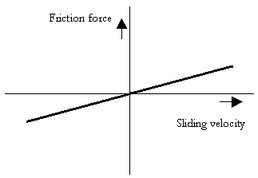Iconic Diagrams\Mechanical\Rotation\Components
C
V
CV
SCVS
LuGre
Domains: Continuous. Size: 1-D. Kind: Iconic Diagrams (Rotation).
The clutch models model represent friction relative to other objects. The amount of friction depends on the normal force that is applied and the friction function that is used. The normal force is given by the input signal FN.
![]()
The port p of the clutch model has separate high and low terminals. The equations are:
p.T = p_high.T = p_low.T
p.omega = p_high.omega - p_low.omega
Due to the use of normal force, the clutch models all have a fixed torque out causality. The constitutive equations are therefore described as:
p.T = Fn * f(p.omega);
with f the friction function.
This model represents bearing with friction force described as coulomb friction. The amount of friction depends on the normal force that is applied and the friction function that is used:
p.T = Tc*tanh(slope*p.omega);
Tc: coulomb friction
slope: the steepness of the coulomb friction curve.

Ports |
Description |
p |
Both terminals of port p (Rotation). |
Causality |
|
Fixed torque out |
|
Input |
|
Fn |
Normal force [N] |
Parameters |
|
Tc slope |
Coulomb friction [N.m] Steepness of Coulomb friction curve [s/rad] |
This model represents a clutch with friction force described as viscous friction. The amount of friction depends on the normal force that is applied and the friction function that is used:
p.T = Fn*mu_v*p.omega;
Fn: normal force (given by the input signal Fn)
mu_v: the viscous friction coefficient

Ports |
Description |
p_high, p_low |
Both terminals of port p (Rotation). |
Causality |
|
Fixed torque out |
|
Input |
|
Fn |
Normal force [N] |
Parameters |
|
mu_v |
Viscous friction coefficient [m.s/rad] |
This model represents a clutch with friction force described as coulomb plus viscous friction. The amount of friction depends on the normal force that is applied and the friction function that is used:
p.T = Fn*(Tc*tanh(slope*p.omega) + mu_v*p.omega);
Fn: normal force (given by the input signal Fn)
mu_v: the viscous friction coefficient
Tc: the coulomb friction coefficient
slope: the steepness of the coulomb friction curve.

Ports |
Description |
p_high, p_low |
Both terminals of port p (Rotation). |
Causality |
|
Fixed torque out |
|
Input |
|
Fn |
Normal force [N] |
Parameters |
|
mu_v Tc slope |
Viscous friction coefficient [m.s/rad] Coulomb friction [N.m] Steepness of Coulomb friction curve [s/rad] |
This model represents a clutch with friction force described as static plus coulomb plus viscous plus Stribeck friction. The amount of friction depends on the normal force that is applied and the friction function that is used:
p.T = Fn *
(( Tc + (mu_st*abs(tanh( slope*p.omega )) - Tc)
* exp( -((p.omega / v_st)^2 )) ) * sign(p.omega)
+ mu_v * p.omega);
Fn: normal force (given by the input signal Fn)
mu_s: the static friction coefficient
mu_v: the viscous friction coefficient
Tc: the coulomb friction coefficient
slope: the steepness of the coulomb and static friction curve.
v_st: the characteristic Stribeck velocity.

Ports |
Description |
p_high, p_low |
Both terminals of port p (Rotation). |
Causality |
|
Fixed torque out |
|
Input |
|
Fn |
Normal force [N] |
Parameters |
|
mu_s mu_v Tc slope v_st |
Static friction coefficient [m] Viscous friction coefficient [m.s/rad] Coulomb friction [N.m] Steepness of Coulomb friction curve [s/rad] Characteristic Stribeck velocity [rad/s] |
This model represents a clutch with friction force described by the LuGre friction model. The amount of friction depends on the normal force that is applied and the friction function that is used:
p.T = FN*f_lg(p.omega);
Fn: normal force (given by the input signal Fn)
f_lg: the LuGre friction model
Ports |
Description |
p_high, p_low |
Both terminals of port p (Rotation). |
Causality |
|
Fixed torque out |
|
Input |
|
Fn |
Normal force [N] |
Parameters |
|
Tc mu_s mu_v v_st mu_k |
Coulomb friction coefficient Static friction coefficient [m] Viscous friction coefficient [m.s/rad] Characteristic Stribeck velocity [rad/s] rotational stiffness coefficient at zero speed [m/rad] |